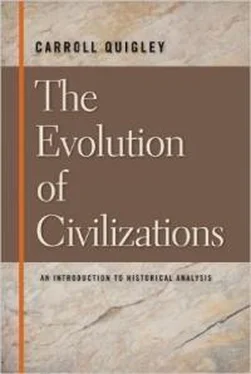Many years ago I took an amazing course in which the whole history of German culture, its literature, music, art, and sculpture, was covered in a single semester from September to January. The most amazing thing about this course was not the amount that was attempted or the professor who taught it, but how successfully it was done. As we raced along, Goethe was covered in fifteen minutes, Schiller in ten, Fichte in five. Later I tried to analyze how this had been done, and realized that the professor had a profound understanding of much that he discussed and that he covered any topic simply by slicing it up into a small number of parts and giving a name to each part. The complex character and achievement of Goethe, for example, were divided into six portions, each was given a title, and, ever after, the whole of Goethe could be evoked merely by reciting six words.
The cultural synthesis that the Ionians created and handed on to the Greeks and that, however modified, remained very largely the culture of all of Classical antiquity is surely more complex than Goethe, but I should like to outdare even my former professor by dividing this greater complexity into only five parts. It seems to me that Classical culture was aristocratic; it was clarid; it was urban; it was balanced; and it was mundane. One of these words will not be found in any dictionary. When I say that Classical culture was "clarid," I mean that it was lucid, clear, rational, in some ways like the Mediterranean sunlight infusing the atmosphere to an astounding clarity.
When we say that Classical culture was aristocratic, we mean much more than that it was the possession of an upper-class minority. We mean that this culture refused to regard either profit or power as goals of life, but rather tended to regard honor and the esteem of one's equals as at least equally worthy goals. It was quite willing to accept a goal for life and an organization of life that functioned economically on a deficit basis, that could not be made available to all men or was not comprehensible to all men, but that had to be supported by many men who could neither share in it nor understand it. This point of view had an aversion to anything practical or vocational; it regarded its goal (honor) as one whose appeal is not (like wealth or power) automatically appreciated but one that is achieved by breeding and discipline. It regarded man as by nature close to the gods but very remote from the animals; it did not accept the equality of men, but did insist on a fraternity of equals within the select group of participants. It emphasized the dignity of the individual, at first only the individual within the chosen group; but later, as democratic influences spread, it tended to grant equality and individual dignity to all, not by bringing the outlook of ordinary men into the select group, but rather by spreading the outlook of the select group outward to ordinary men. To do this it was necessary, while allowing the select group to grow constantly larger, to continue to emphasize the superiority of the members of the group over outsiders. At first the group consisted only of those of noble birth; later it was the citizens of the city-state. As this group was expanded, emphasis continued on the distinction between free men and slaves, between Greek and barbarian, between those who had the political franchise and those who lacked it. Only when Classical culture was in its decline (after the time of Christ) did it begin to accept the equality of all men. Even then it insisted that all men had human dignity, had a kind of divinity, and were worthy of respect. Thus to the very end, Classical culture kept certain elements of its aristocratic outlook, and never, like the Hebrews, came to regard man as a helpless and cringing worm. One last characteristic of an aristocratic outlook that Classical culture maintained to the end was its belief in social retrogression rather than in social progress and its conviction that the golden age was to be found in the past rather than in the future. This gave the culture an underlying pessimism redeemed by the fact that man's fate, however hopeless, must be borne with dignity. This belief in a past golden age and the refusal to accept the idea of progress is to be found in Homer and Hesiod in a most explicit fashion and undoubtedly is the result of some dim social memory of the Cretan civilization or of Mycenaean culture.
In saying that Classical culture was cl arid, we mean that it possessed the qualities of rationality, lucidity, and clarity. This culture sought explanations rather than sensations. These explanations were regarded as satisfactory if they led to some concept that could be grasped by man's conscious mind. Thus, for example, the immortality of the gods was explained on the grounds that gods ate a special food, ambrosia, that would also give immortality to men, if they could obtain it.
When we say that this culture was urban, we mean that it was possessed by a city-dwelling group who knew one another personally, saw one another frequently, exchanged views by conversation or letter, rather than by media of mass communication, were remote from the productive system, either agriculture or commerce, and regarded loyalty to the state and to its gods as the chief duty and chief privilege of existence.
When we say that this culture was balanced, we mean that it held the golden mean in high esteem, that it regarded excess or extremes with distaste and felt that such excess could lead only to disaster and to retribution. The expression "golden mean," the motto "nothing too much," the idea that excess leads to retribution (nemesis): these are all derived from Classical culture. This ideal of balance appeared in their ethics as nemesis; in their politics in the idea that justice was a balance of different elements; in their art as the principle of proportion; in their literature, especially the drama, as the idea that nemesis is always the consequence of hybris (excess of personal pride and self-exaltation); in their social outlook in the belief that society was a balance of different groups or classes.
When we say that this culture was mundane, we mean that it was humanistic, anthropocentric, and thisworldly. It regarded man as the center of everything; it interpreted everything in terms of human aims; it had no real concern with life after death or with the gods, and had no real idea of eternity or of reward or punishment in the afterlife. It had no real idea of the nature of divinity until very late, and then achieved this idea as a consequence of an aristocratic pursuit of truth, a rationalistic pursuit by men with leisure and with no real regard for wealth or power. This mundane character of Classical culture meant that this culture, in extreme cases, was materialistic in its outlook; but it was able to escape the ordinary consequences of materialism because of its ideals of aristocracy and moderation.
The creation of this synthesis from past elements, some of which (like Minoan or Mesopotamian) had a long history, explains why there were so few primitive elements in Greek culture and why, when these elements did occasionally emerge from the submerged or rural masses (as in the mystery religions), they were immediately modified or rejected. This also explains why the oldest surviving Greek writer, Homer, was neither primitive nor unsophisticated, but had a simplicity, a gravity, a balance, a dignity, a subtlety, that made him appear as the culmination of a long epic tradition and the last example of a sophisticated culture. This indeed he was, a kind of post-mortem manifestation of the Mycenaean Age, looking back on it as a golden age, but nonetheless writing in Greek and thus capable of becoming, as he did become, the model for the future Classical culture.
1. Mixture
The period of mixture of Classical civilization covers the Iron Age invasions which destroyed Cretan civilization and continues onward into the period when the Phoenicians began to bring back the basic necessities of civilized living. In our usual arbitrary fashion, we might say that the period of mixture lasted from 1200 to 900 and that the following Age of Gestation covered the next hundred years to about 800 B.C.
Читать дальше










